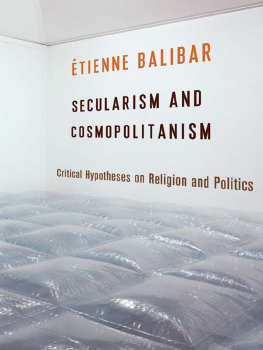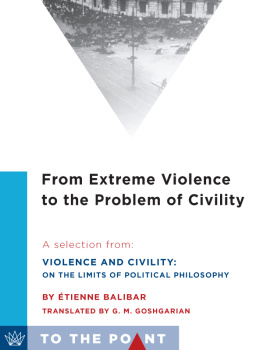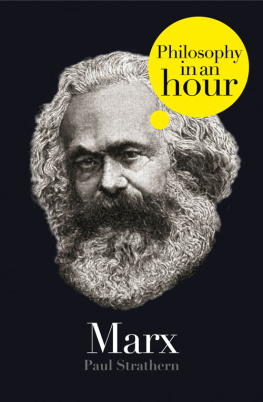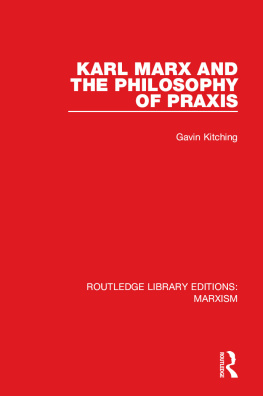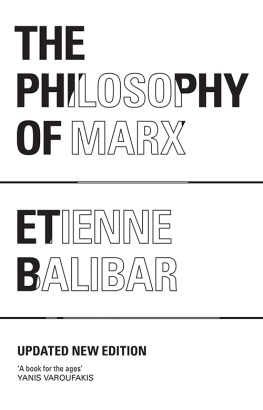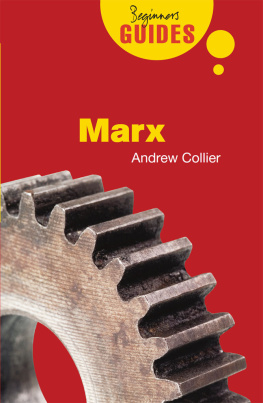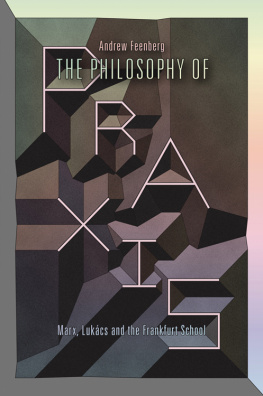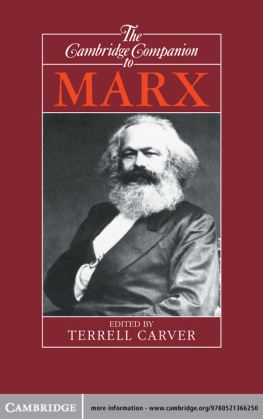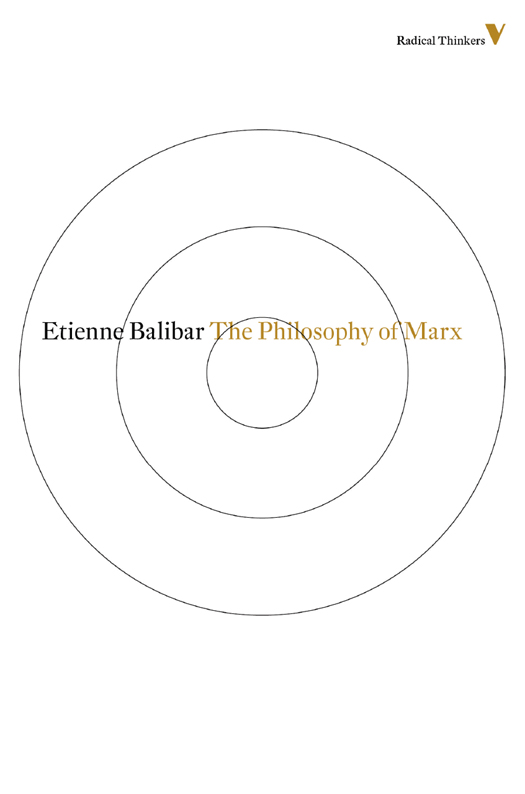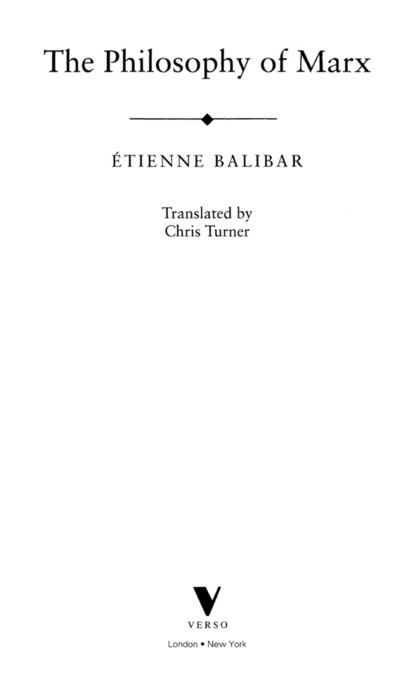This book has been published with financial support from the French Ministry of Foreign Affairs Sous-Direction de la Politique du Livre
This edition published by Verso 2014
Translation Chris Turner 1995, 2007, 2014
First published as La philosophie de Marx
La Decouverte 1993
All rights reserved
The moral rights of the author have been asserted
Verso
UK: 6 Meard Street, London W1F 0EG
US: 20 Jay Street, Suite 1010, Brooklyn, NY 11201
www.versobooks.com
Verso is the imprint of New Left Books
ISBN-13: 978-1-78168-153-4
eBook ISBN: 978-1-78168-207-4
eISBN (UK): 978-1-78168-516-7
British Library Cataloguing in Publication Data
A catalogue record for this book is available from the British Library
Library of Congress Cataloging-in-Publication Data
A catalog record for this book is available from the Library of Congress
v3.1
Contents
1
Marxist Philosophy or Marxs Philosophy?
The general idea of this little book is to understand and explain why Marx will still be read in the twenty-first century, not only as a monument of the past, but as a contemporary author contemporary both because of the questions he poses for philosophy and because of the concepts he offers it. Limiting myself to what seem to me the essentials, I would like to give readers a means of finding their bearings in Marxs writings and introduce them to the debates which they have prompted. I would also like to defend a somewhat paradoxical thesis: whatever may have been thought in the past, there is no Marxist philosophy and there never will be; on the other hand, Marx is more important for philosophy than ever before.
We have first to come to some understanding on the meaning of Marxist philosophy. This expression might refer to two quite different things, though the tradition of orthodox Marxism, which developed at the end of the nineteenth century and was institutionalized by the Communist state-parties after 1931 and 1945, considered them indissociable: the world-view of the socialist movement, based on the idea of the historic role of the working class, and the system attributed to Marx. Let us note right away that neither of these ideas is strictly connected with the other. Various terms have been invented to express the philosophical content common to Marxs work and to the political and social movement which acted in his name: the most famous of these is dialectical materialism, a relatively late term and one inspired by the use Engels had made of various of Marxs Conversely, there has never been any shortage of philologists or critical thinkers to emphasize the distance between the content of Marxs texts and their later Marxist fate, and to show that the existence of a philosophy in Marx in no way implies the subsequent existence of a Marxist philosophy.
This debate may be settled in a manner as simple as it is radical. The events which marked the end of the great cycle during which Marxism functioned as an organizational doctrine (18901990), have added nothing new to the discussion itself, but have swept away the interests which opposed its being opened up. There is, in reality, no Marxist philosophy, either as the world-view of a social movement, or as the doctrine or system of an author called Marx. Paradoxically, however, this negative conclusion, far from nullifying or diminishing the importance of Marx for philosophy, greatly increases it. Freed from an illusion and an imposture, we gain a theoretical universe.
Philosophy and non-philosophy
A new difficulty awaits us here. Marxs theoretical thinking presented itself, at various points, not as a philosophy, but as an alternative to philosophy, a non-philosophy or even an anti-philosophy. And it has perhaps been the greatest anti-philosophy of the modern age. For Marx, philosophy as he had learnt it, from the tradition which ran from Plato to Hegel, including more or less dissident materialists like Epicurus or Feuerbach, was in fact merely an individual undertaking aimed at interpreting the world. At best this led to leaving the world as it was; at worst, to transfiguring it.
However, opposed as he was to the traditional form and usages of philosophical discourse, there can be little doubt that he did himself interlace his historico-social analyses and proposals for political action with philosophical statements. He has been sufficiently criticized by positivism for doing this. What we need to establish, then, is whether these statements form a coherent whole. My hypothesis is that this is not the case at all, at least if the idea of coherence to which we are referring continues to be informed by the idea of a system. Having broken with a certain form of philosophy, Marx was not led by his theoretical activity towards a unified system, but to an at least potential plurality of doctrines which has left his readers and successors in something of a quandary. Similarly, it did not lead him to a uniform discourse, but to a permanent oscillation between falling short of and going beyond philosophy. By falling short of philosophy, I mean stating propositions as conclusions without premisses, as Spinoza and Althusser would have put it. One example is the famous formula from The Eighteenth Brumaire of Louis Bonaparte which Sartre, among others, considered the central thesis of historical materialism: Men make their own history, but not of their own free will; not under circumstances they themselves have chosen but under the given and inherited circumstances with which they are directly confronted. By going beyond philosophy, on the other hand, I mean a discourse which shows that philosophy is not an autonomous activity, but one determined by the position it occupies in the field of social conflicts and, in particular, in that of the class struggle.
Dialectical materialism
This term was used to refer to philosophy in the official doctrine of the Communist parties, and it has also been employed by a number of critics of that doctrine (see Henri Lefebvre, Dialectical Materialism (1940) trans. John Sturrock, Cape, London, 1968. It was not used by either Marx (who spoke of his dialectical method) or Engels (who uses the expression materialist dialectic), but seems to have been invented in 1887 by Joseph Dietzgen, a socialist worker who corresponded with Marx. It was, however, on the basis of Engelss work that Lenin developed this theory (in Materialism and Empirio-criticism, 1908) around three guiding themes: the materialist inversion of the Hegelian dialectic; the historicity of ethical principles in their relation to the class struggle; and the convergence of the laws of evolution in physics (Helmholtz), biology (Darwin) and political economy (Marx). Lenin thus takes up a position between a historicist Marxism (Labriola) and a determinist Marxism, akin to Social Darwinism (Kautsky). After the Russian Revolution, Soviet philosophy was divided between the dialecticians (Deborin) and the mechanists (Bukharin). The debate was settled by General Secretary Stalin who, in 1931, issued a decree identifying dialectical materialism with Marxism-Leninism (cf. Ren Zapata, Luttes philosophiques en URSS 192231, Presses Universitaires de France, Paris, 1983). Seven years later, in the pamphlet


